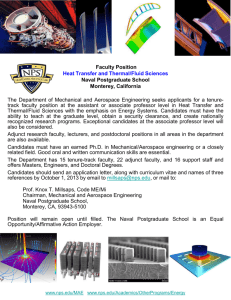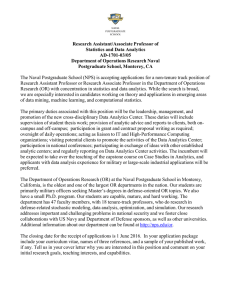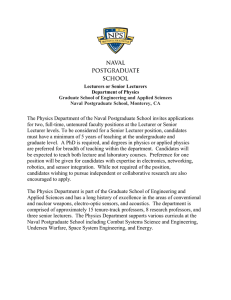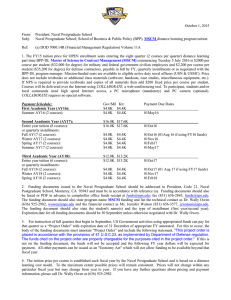It's More Than a Job or an Adventure
advertisement
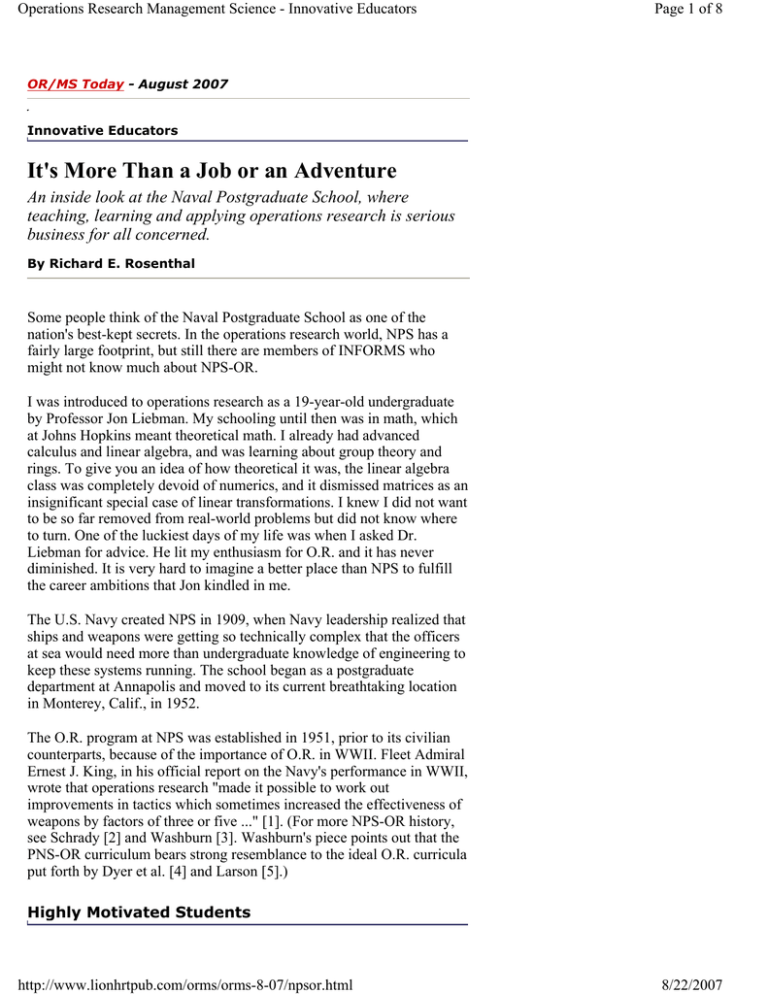
Operations Research Management Science - Innovative Educators Page 1 of 8 OR/MS Today - August 2007 Innovative Educators It's More Than a Job or an Adventure An inside look at the Naval Postgraduate School, where teaching, learning and applying operations research is serious business for all concerned. By Richard E. Rosenthal Some people think of the Naval Postgraduate School as one of the nation's best-kept secrets. In the operations research world, NPS has a fairly large footprint, but still there are members of INFORMS who might not know much about NPS-OR. I was introduced to operations research as a 19-year-old undergraduate by Professor Jon Liebman. My schooling until then was in math, which at Johns Hopkins meant theoretical math. I already had advanced calculus and linear algebra, and was learning about group theory and rings. To give you an idea of how theoretical it was, the linear algebra class was completely devoid of numerics, and it dismissed matrices as an insignificant special case of linear transformations. I knew I did not want to be so far removed from real-world problems but did not know where to turn. One of the luckiest days of my life was when I asked Dr. Liebman for advice. He lit my enthusiasm for O.R. and it has never diminished. It is very hard to imagine a better place than NPS to fulfill the career ambitions that Jon kindled in me. The U.S. Navy created NPS in 1909, when Navy leadership realized that ships and weapons were getting so technically complex that the officers at sea would need more than undergraduate knowledge of engineering to keep these systems running. The school began as a postgraduate department at Annapolis and moved to its current breathtaking location in Monterey, Calif., in 1952. The O.R. program at NPS was established in 1951, prior to its civilian counterparts, because of the importance of O.R. in WWII. Fleet Admiral Ernest J. King, in his official report on the Navy's performance in WWII, wrote that operations research "made it possible to work out improvements in tactics which sometimes increased the effectiveness of weapons by factors of three or five ..." [1]. (For more NPS-OR history, see Schrady [2] and Washburn [3]. Washburn's piece points out that the PNS-OR curriculum bears strong resemblance to the ideal O.R. curricula put forth by Dyer et al. [4] and Larson [5].) Highly Motivated Students http://www.lionhrtpub.com/orms/orms-8-07/npsor.html 8/22/2007 Operations Research Management Science - Innovative Educators Page 2 of 8 The worst thing about NPS education is that it is not open to the public. Yet, some of the best things about NPS education derive from this fact. We know where our students are coming from — they are mid-career officers of the U.S. and allied military services — and we know what kind of work they will be doing when they graduate. Their employers maintain close contact with us, providing regular feedback on the effectiveness of our graduates. The services pay our students full salaries, house them and their families, and provide complete medical care. Thus, we can work them at full throttle 48 weeks a year, with two weeks off at Christmas and the 4th of July. The NPS students take their studies quite seriously. They are evaluated as military officers in part by how effectively they perform as students. So as professors, we generally have their complete attention. People in the civilian world may not realize how important evaluation is to an officer. The military will only promote those whose careers have had experience and demonstrated mastery of subordinate roles, and in addition shown merit and achievement to deserve the next promotion. It is an "up or out" system, and there is no such thing as a sideways move. The U.S. Army does not poach talent from the U.S. Navy or from another country's services. Contrast this to the civilian world, where a freshly minted MBA might end up in an executive position, and a senior executive or even the CEO may be hired away from another company. Understanding the dynamics of military officers' careers is important for us in dealing with our students on an individual level and, incidentally, it creates opportunities for some interesting O.R. problems. While we faculty are evaluating the students, so are they evaluating us. We pay close attention to our students, particularly their opinions of our instruction. These are professional military officers and keen judges of professional performance. Every NPS-OR student writes a thesis. This is a huge commitment of faculty and student time, but an important one. Our graduates immediately assume positions of responsibility requiring constant reviews of technical work, reports, white papers, presentations and the like. We use the thesis exercise as a summary personal study course to hone O.R. analytical and expository skills. Faculty do not use teaching assistants. We grade and advise personally. It helps that NPS has a remarkable 4:1 student-to-faculty ratio, and no class has more than 30 students. The flip side of having 45 O.R. faculty to share the thesis load is that we don't have enough courses to keep everyone teaching full time. Consequently, faculty bring in about half their salary from research sponsors. Distinguished Professor Jerry Brown advises new faculty: "Take good http://www.lionhrtpub.com/orms/orms-8-07/npsor.html 8/22/2007 Operations Research Management Science - Innovative Educators Page 3 of 8 care of your students, they deserve it, and eventually you'll be working for one of them." Brown should know: His thesis student U.S. Army then-Capt. Tom White went on to become a general and, later, Secretary of the Army. His linear programming student U.S. Navy then-Lt. Mike Mullen is now the Chief of Naval Operations, our nation's top naval officer. Mullen has been nominated to serve as Chairman of the Joint Chiefs of Staff, America's top military officer. Brown continues: "That Admiral Mullen is best known as a problemsolver is no surprise, that's the core focus of our MS-OR program." Indeed, many research sponsors are former students. NPS OR faculty frequently receive calls from former students, asking us to participate in solving exigent problems. In 2005, Professor Rob Dell got a call from Iraq from a graduate who needed help in planning airlifts. Within weeks, he and Brown were in country, and — while Professor Matt Carlyle was generating columns around the clock back home for their optimization model — they had a fleet- and cargo-scheduling solver up and running. Professor Bob Koyak and his student, Marine Maj. Matt Reuter, are working a murky, but vitally important data analysis problem based on vehicle maintenance records from Iraq. In the accompanying sidebar, Koyak conveys the sense of urgency and excitement NPS students and faculty have about working on real problems. Professor Moshe Kress and frequent visitor Professor Ed Kaplan of Yale have earned a great deal of attention with their models of suicide bombing [6]. The New York Times called this work one of the 50 most important ideas of 2005 and described its surprising findings to a wide audience [7]. Homeland security is a key theme in NPS OR education and research. Professor Kevin Wood initiated the use of attacker-defender games, solved in the form of multi-level optimization models, to assess the vulnerability and plan the protection of critical infrastructure [8]. This modeling approach is taught to every O.R. graduate. Compare, Contrast With Civilian O.R. Most courses in the O.R. curriculum cover topics similar to courses in civilian O.R. programs — computational methods, statistics, data analysis, stochastic models, linear and nonlinear optimization, network flows, simulation, decision analysis and game theory — but all of these are enriched with examples that relate to the students' experience and the professors' (and former students') research. http://www.lionhrtpub.com/orms/orms-8-07/npsor.html 8/22/2007 Operations Research Management Science - Innovative Educators Page 4 of 8 We also have courses and topics that are not commonly found in other programs. In direct response to the needs of the services that employ our graduates, these include campaign analysis, combat modeling, cost analysis, firing theory, human factors in system design, test and evaluation, search and detection theory and war-gaming. We even have an "O.R. by Excel" capstone course, very popular with students and our sponsors. (We think it is important to teach the more in-depth treatment of O.R. topics, before the student sees the spreadsheet versions.) There is a great deal of emphasis in our courses on projects and presentations, because we know our students will need to be skilled in these activities on their jobs. For example, in our networks class, following the guidance of Professor Carlyle, students form "Red Teams" that plan the optimal attack and defense of infrastructure systems (transportation networks, data communications, pipelines, power distribution networks, nuclear weapons development programs, etc.). Some of these projects have received attention at high levels in the government. Many student and faculty projects have led to widely used products in the services. Professor Wayne Hughes' book "Fleet Tactics" [9] has been translated into numerous languages and is said to be in every wardroom afloat. Distinguished Professor Alan Washburn's collection of teaching materials on search and detection, Kalman filters, Lanchester equations and firing theory are widely used in the military O.R. world, as is his software for anti-submarine warfare. The Marine Corps used an NPS network model for mobilizing officers [10]. A paper published in Operations Research in 2005 was recently developed into a system used for theater missile defense [11]. Capt. Jeff Kline, a former student and current faculty member, applied a simple linear program for conserving fuel when he was in command of a ship [12]. His ship's fuel usage was so much lower than her sister ships that Kline was inspected for safety violations. His performance was vindicated and the LP method was promulgated throughout the fleet. A total of eight master's of science theses have addressed various aspects of planning Tomahawk missile strikes from ships and submarines — this has culminated in the system the Navy now uses for this purpose. New problems arrive almost every day. For example, Professor Gordon Bradley is in frequent contact with former students stationed in Iraq. They are trying ideas Bradley and his current students send back for dealing with improvised explosive devices. These officers are using generator power from forward bases, but they still respond moments after being contacted. We can exchange e-mail and video with them at any level of classification. Thus, NPS-OR is part of a real-time, networked-O.R. military campaign. Tying this sort of experience into the O.R. education is a priceless opportunity for our students. The Experience Tour http://www.lionhrtpub.com/orms/orms-8-07/npsor.html 8/22/2007 Operations Research Management Science - Innovative Educators Page 5 of 8 A vital piece of the NPS-OR approach to education is what we call the experience tour. This is a six-week period at roughly the midpoint of the curriculum in which students go off campus to an organization where they can gain practical analytical experience. In most cases, the tour is tied to the student's eventual thesis topic, and is related to the faculty advisor's sponsored research. We fought over the years to retain the experience tour when various bean-counters have tried to find ways to cut the cost of the NPS-OR master's degree. As Distinguished Professor and Provost Emeritus David Schrady says, "The experience tour is essential because the laboratory of O.R. is the real world." Our master's program lasts at least two years, and it is a terminal degree for more than 90 percent of our students. Depending on the student's background, a one-quarter engineering science and mathematics brushup can be added. Current O.R. students at NPS include 21 international officers from 10 countries (Bahrain, Germany, Greece, Israel, Japan, Korea, Singapore, Spain, Taiwan and Turkey) and 144 U.S. officers from the Army, Navy, Marine Corps and Air Force. Our students learn much from their classmates' about their services, combat specialties and countries. Each year we start one cohort in the fall and another in the spring. The cohorts stay largely together, so strong friendships develop during classes, study sessions and after-hours socializing which bridge the military service and country differences. Each cohort has a section leader, so communication with the faculty is quick and effective. NPS is very proud of a story that has been passed down like family lore for at least as long as I have been on the faculty (23 years). There was a skirmish in Cypress, which prompted Greece and Turkey to send warships to the area. The tension was rising. It looked like serious conflict could break out at any moment. A last-ditch effort at diplomacy was called for and representatives of both navies were gathered. Suddenly, two officers on opposite sides of the table recognized each other as fellow NPS students and began to reminisce. There was a dramatic change in the mood at that moment, and an international crisis was averted. Several allied student-officers have gone on to great success in their services. The Chief Defense Scientist of Singapore, Pao Cheun Lui, is an NPS OR graduate, as is the recent Chief of Naval Operations for the Turkish Navy. Admiral Mullen says this about his NPS OR degree: "I think the O.R. curriculum I went through is very relevant to what we do in the Navy. I've used it in the Pentagon, at sea and in war-fighting. What the curriculum taught me to do was properly frame a problem, ask the right questions, assess the risks and move on from there." We are proud of our graduates! http://www.lionhrtpub.com/orms/orms-8-07/npsor.html 8/22/2007 Operations Research Management Science - Innovative Educators Page 6 of 8 Richard E. Rosenthal (RRosenthal@nps.edu) is a professor in the Operations Research Department at the Naval Postgraduate School in Monterey, Calif. He has been on the NPS faculty since 1984 and served as department chairman from 1997-2000. He was the editor in chief of the journal Naval Research Logistics from 1988-2003 and currently serves as a vice president of INFORMS. Rosenthal has a passionate interest in the application of O.R. His research projects for the U.S. military have touched all branches and include studies of transportation, logistics, manpower and operations. He has also worked on civilian applications, most recently as a visiting senior scientist at Hewlett-Packard Labs. He is a winner of the INFORMS Award for the Teaching of Operations Research Practice (2000), a Fulbright Award (1981) and a National Academy of Sciences Senior Postdoctoral Research Award (1984), as well as the Koopman (1990), Barchi (1992) and Rist (1993 and 1997) prizes for military applications of operations research. He earned a B.A. in mathematical sciences from Johns Hopkins in 1972 and a Ph.D. in O.R. from Georgia Tech in 1975. Clarity in the Fog of War By Robert Koyak Operations research as a whole benefits from having hard problems in data analysis and statistical inference engaged by those with expertise in these areas. Statistical analysis also benefits from treating problems as having more than a quantitative aspect. Data are more than a collection of numbers. Our students learn to view real-world problems as multidisciplinary, and to use all the skills at their disposal to handle them with integrity. Because our master's students must complete a thesis in order to graduate, they quickly see the contrast between problems as presented in their textbooks (polished diamonds) and the subjects of their thesis research (diamonds in the rough). The contrast can be disillusioning. I will use a current advisee as a case in point. Maj. Matt Reuter, USMC, has assembled, with painstaking care a dataset consisting of the maintenance activity of 456 land vehicles (MTVRs) that have been fielded in Iraq. The maintenance records chronicle both scheduled and unscheduled maintenance events, and the dates upon which the vehicles were outfitted with armoring (which adds approximately five tons of weight to each vehicle). The sponsor wants to be informed about the operational reliability of these vehicles under field conditions in Operation Iraqi Freedom (OIF). On the face of it, this project is a feast for a reliability modeler: it has a great story, real-world data, multiple failure http://www.lionhrtpub.com/orms/orms-8-07/npsor.html 8/22/2007 Operations Research Management Science - Innovative Educators Page 7 of 8 modes (we are studying 11 of them), preventative maintenance events and interesting explanatory variables. Time to dig in, right? It would be, were it not for a few pesky details. For example, each data record is supposed to contain an odometer reading for the vehicle at the time of the maintenance event. Usage time is much better than chronological time for quantifying reliability, so we clearly want to have credible odometer readings. Unfortunately, most of the odometer readings are either missing, given phony values such as "9999" or "12345," or constitute a schizophrenic profile when a vehicle is considered across time. Other serious data-quality problems exist as well. A RAND study noted that a 20 percent error rate is fairly typical for records in defense-related maintenance data bases, and what we have found suggests that this may be an understatement. Many statistical modelers would choose to defer their feast for another day, but for my student the questions that must be answered would still remain. His thesis will describe dataquality shortfalls and how they impact his analysis, because these are things that his sponsor should know. He will tell them, for example, that the maintainers may be confusing the odometer with the tachometer, which are located side-by-side on the interior panel, and which may be causing the wild variations in recorded odometer readings that he observed. He will answer the important questions to the best of his ability, but with honesty about the uncertainty in his results due both to stochastic variability and to data-quality shortfalls. Robert Koyak is an associate professor in the O.R. Department at the Naval Postgraduate School in Monterey, Calif. References 1. King, Fleet Adm. Ernest J., "United States Navy at War: Final Official Report to the Secretary of the Navy," United States Naval Institute Proceedings, January 1946, p. 174. 2. David Schrady, 2001, "Golden Anniversary: Fifty years of graduate education in operations research produces 3,300 alumni worldwide," OR/MS Today, February 2001. 3. Alan R. Washburn, 1996, "The Teachers' Forum: The Operations Analysis Curriculum at the Naval Postgraduate School," Interfaces, Vol. 26, SeptemberOctober 1996, pp. 71-80. 4. Dyer, J., Bean, J., Dewald, L., Gepfert, A., and Odoni, A., 1993, "Suggestions for an MS/OR Master's Degreee Curriculum," OR/MS Today, February 1993, pp. 16-31. 5. Larson, R.C., 1992, "Teaching Operations Research as Research on Operations," OR/MS Today, April 1992, pp. 36-40. 6. Edward Kaplan and Moshe Kress, 2005, "Operational Effectiveness of Suicide http://www.lionhrtpub.com/orms/orms-8-07/npsor.html 8/22/2007 Operations Research Management Science - Innovative Educators 7. 8. 9. 10. 11. 12. Page 8 of 8 Bomber Detector Schemes: A Best-Case Analysis," Proceedings of the National Academy of Science, Vol. 102, No. 29, pp. 10,399-10,404. Tough, Paul, 2005, "Preventing Suicide Bombing," The New York Times Sunday Magazine, Dec. 11, 2005. Brown, G., Carlyle, M., Salmerón, J. and Wood, K., 2006, "Defending Critical Infrastructure," Interfaces, Vol. 36, pp. 530-544. Hughes, Wayne P. Jr., 1999, "Fleet Tactics and Coastal Combat, 2nd Edition," Naval Institute Press. Bausch, D.O., Brown, G.G., Hundley, D.R., Rapp, S.H. and Rosenthal, R.E., 1991, "Mobilizing Marine Corps Officers," Interfaces, Vol. 21, pp. 26-38. Brown, G., Carlyle, M., Diehl, D., Kline, J. and Wood, K., 2005, "A Two-Sided Optimization for Theater Ballistic Missile Defense," Operations Research, Vol. 53, pp. 263-275. Brown, G., Kline, J.E., Rosenthal, R. E., Washburn, A., 2007, "Steaming on Convex Hulls," Interfaces, July-August 2007. Military Cuff Links Distinctive, unique cufflinks for Army, Navy, Air Force and Marines www.justcufflinks.com Naval Postgraduate School Request training info from schools, including Naval Postgraduate School NPS.College-lnfo.net Operations Research Phd No Time to Attend Classes? Get Your Doctorate Degree Online. Free Info www.WaldenOnlineDegrees.com z Table of Contents z OR/MS Today Home Page OR/MS Today copyright © 2007 by the Institute for Operations Research and the Management Sciences. All rights reserved. Lionheart Publishing, Inc. 506 Roswell Rd., Suite 220, Marietta, GA 30060 USA Phone: 770-431-0867 | Fax: 770-432-6969 E-mail: lpi@lionhrtpub.com URL: http://www.lionhrtpub.com Web Site © Copyright 2007 by Lionheart Publishing, Inc. All rights reserved. http://www.lionhrtpub.com/orms/orms-8-07/npsor.html 8/22/2007
